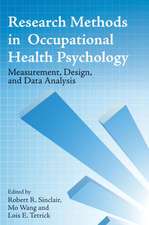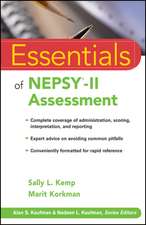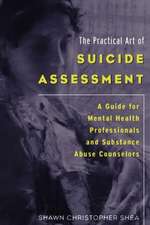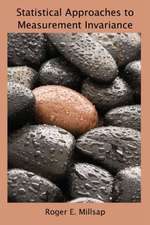Frontiers of Test Validity Theory: Measurement, Causation, and Meaning: Multivariate Applications Series
Autor Keith A. Markus, Denny Borsboomen Limba Engleză Paperback – 9 apr 2013
Each chapter begins with an overview of key material reviewed in previous chapters, concludes with a list of suggested readings, and features boxes with examples that connect theory to practice. These examples reflect actual situations that occurred in psychology, education, and other disciplines in the US and around the globe, bringing theory to life. Critical thinking questions related to the boxed material engage and challenge readers. A few examples include:
What is the difference between intelligence and IQ?
Can people disagree on issues of value but agree on issues of test validity?
Is it possible to ask the same question in two different languages?
The first part of the book contrasts theories of measurement as applied to the validity of behavioral science measures.The next part considers causal theories of measurement in relation to alternatives such as behavior domain sampling, and then unpacks the causal approach in terms of alternative theories of causation.The final section explores the meaning and interpretation of test scores as it applies to test validity. Each set of chapters opens with a review of the key theories and literature and concludes with a review of related open questions in test validity theory.
Researchers, practitioners and policy makers interested in test validity or developing tests appreciate the book's cutting edge review of test validity. The book also serves as a supplement in graduate or advanced undergraduate courses on test validity, psychometrics, testing or measurement taught in psychology, education, sociology, social work, political science, business, criminal justice and other fields. The book does not assume a background in measurement.
| Toate formatele și edițiile | Preț | Express |
|---|---|---|
| Paperback (2) | 353.39 lei 6-8 săpt. | +25.70 lei 6-12 zile |
| Taylor & Francis – 16 dec 2024 | 384.89 lei 3-5 săpt. | +25.70 lei 6-12 zile |
| Taylor & Francis – 9 apr 2013 | 353.39 lei 6-8 săpt. | |
| Hardback (2) | 858.60 lei 6-8 săpt. | |
| Taylor & Francis – 8 apr 2013 | 858.60 lei 6-8 săpt. | |
| Taylor & Francis – 16 dec 2024 | 1010.85 lei 6-8 săpt. |
Din seria Multivariate Applications Series
- 8%
 Preț: 392.27 lei
Preț: 392.27 lei - 8%
 Preț: 420.74 lei
Preț: 420.74 lei -
 Preț: 404.21 lei
Preț: 404.21 lei - 8%
 Preț: 513.30 lei
Preț: 513.30 lei - 8%
 Preț: 384.68 lei
Preț: 384.68 lei - 8%
 Preț: 384.89 lei
Preț: 384.89 lei -
 Preț: 503.74 lei
Preț: 503.74 lei -
 Preț: 495.09 lei
Preț: 495.09 lei -
 Preț: 350.73 lei
Preț: 350.73 lei -
 Preț: 493.12 lei
Preț: 493.12 lei - 15%
 Preț: 694.68 lei
Preț: 694.68 lei - 15%
 Preț: 456.63 lei
Preț: 456.63 lei - 8%
 Preț: 513.70 lei
Preț: 513.70 lei - 15%
 Preț: 578.93 lei
Preț: 578.93 lei - 18%
 Preț: 943.45 lei
Preț: 943.45 lei - 8%
 Preț: 391.97 lei
Preț: 391.97 lei - 24%
 Preț: 356.43 lei
Preț: 356.43 lei - 15%
 Preț: 493.88 lei
Preț: 493.88 lei - 13%
 Preț: 349.81 lei
Preț: 349.81 lei -
 Preț: 501.60 lei
Preț: 501.60 lei -
 Preț: 363.00 lei
Preț: 363.00 lei - 15%
 Preț: 464.18 lei
Preț: 464.18 lei - 18%
 Preț: 1017.81 lei
Preț: 1017.81 lei -
 Preț: 438.75 lei
Preț: 438.75 lei -
 Preț: 418.17 lei
Preț: 418.17 lei -
 Preț: 505.41 lei
Preț: 505.41 lei
Preț: 353.39 lei
Preț vechi: 454.85 lei
-22% Nou
Puncte Express: 530
Preț estimativ în valută:
67.62€ • 71.11$ • 55.87£
67.62€ • 71.11$ • 55.87£
Carte tipărită la comandă
Livrare economică 17 aprilie-01 mai
Preluare comenzi: 021 569.72.76
Specificații
ISBN-13: 9781841692203
ISBN-10: 1841692204
Pagini: 360
Ilustrații: 40 black & white illustrations, 5 black & white tables, 2 black & white halftones, 33 black & white line drawings
Dimensiuni: 152 x 229 x 23 mm
Greutate: 0.48 kg
Ediția:New.
Editura: Taylor & Francis
Colecția Routledge
Seria Multivariate Applications Series
Locul publicării:Oxford, United Kingdom
ISBN-10: 1841692204
Pagini: 360
Ilustrații: 40 black & white illustrations, 5 black & white tables, 2 black & white halftones, 33 black & white line drawings
Dimensiuni: 152 x 229 x 23 mm
Greutate: 0.48 kg
Ediția:New.
Editura: Taylor & Francis
Colecția Routledge
Seria Multivariate Applications Series
Locul publicării:Oxford, United Kingdom
Public țintă
ProfessionalCuprins
1. Introduction: Surveying the Field of Test Validity Theory. 2. Philosophical Theories of Measurement. 3. Psychometric Models. 4. Open Issues in Measurement Theory and Psychometrics. 5. Test Scores as Samples: Behavior Domain Theory. 6. Causality in Measurement. 7. Causation, Correlation, and Reflective Measurement Models. 8. Problems in Causation and Validity: Formative Measurement, Networks, and Individual Differences. 9. Interpreting Test Responses: Validity, Values, and Evaluation. 10. A Model of Test Score Interpretation. 11. Open Questions About Test Score Meaning. 12. An Integrative View of Test Validity. 13. Epilogue as Dialog: The Future of Test Validity Theory.
Recenzii
"Psychologists Markus and Borsboom have done an excellent job of arguing that validity theory is in serious need of more research. For those in the behavioral sciences who are already well versed in the assessment, this book will provide an invaluable source for understanding why they might want to revisit many of the fundamental assumptions of their field. For less experienced readers, the book may be a steep climb but well worth the effort when taken one step at a time. Summing Up: Highly Recommended. Graduate students, faculty, researchers, professionals." – J.F. Heberle, Albright College, CHOICE Magazine
“It is a formidable achievement to write a book on validity, covering measurement, causation, and meaning, with a discussion from psychometric, philosophical, and practical perspectives. It is why one would want to read this book. It leads to a deep understanding and makes one think beyond common ways of thinking." – Paul De Boeck, Ohio State University, USA & KU Leuven, Belgium
"This book would serve as a seminal resource on validity. It challenges practitioners and the field ... to reflect [on] and identify the salient evidence of one of the most important characteristics that we require of all tests." – Terry Ackerman, University of North Carolina at Greensboro, USA
"The book will make a very valuable contribution to the field by bringing much of its (often ignored) theoretical underpinnings to light in a…straightforward manner.…[It] will be of great interest to measurement and psychometric researchers, as well as to philosophers of statistics.…It gives important insight into a variety of issues." – Brian Habing, University of South Carolina, USA
"The authors are raising thought-provoking questions about the nature of measurement, causality, and validity.…Markus and Borsboom are raising the bar for what it means to be called a validity theorist." - Derek Briggs, University of Colorado, Boulder, USA
“This book provides a unique contribution to the topic of test validity. It is an interesting interdisciplinary approach combining elements of philosophy, social sciences, and math. I found as I was reading that I was forced to think differently about several concepts. I am not aware of any book like this.” – Jean Powell Kirnan, The College of New Jersey, USA
“It is a formidable achievement to write a book on validity, covering measurement, causation, and meaning, with a discussion from psychometric, philosophical, and practical perspectives. It is why one would want to read this book. It leads to a deep understanding and makes one think beyond common ways of thinking." – Paul De Boeck, Ohio State University, USA & KU Leuven, Belgium
"This book would serve as a seminal resource on validity. It challenges practitioners and the field ... to reflect [on] and identify the salient evidence of one of the most important characteristics that we require of all tests." – Terry Ackerman, University of North Carolina at Greensboro, USA
"The book will make a very valuable contribution to the field by bringing much of its (often ignored) theoretical underpinnings to light in a…straightforward manner.…[It] will be of great interest to measurement and psychometric researchers, as well as to philosophers of statistics.…It gives important insight into a variety of issues." – Brian Habing, University of South Carolina, USA
"The authors are raising thought-provoking questions about the nature of measurement, causality, and validity.…Markus and Borsboom are raising the bar for what it means to be called a validity theorist." - Derek Briggs, University of Colorado, Boulder, USA
“This book provides a unique contribution to the topic of test validity. It is an interesting interdisciplinary approach combining elements of philosophy, social sciences, and math. I found as I was reading that I was forced to think differently about several concepts. I am not aware of any book like this.” – Jean Powell Kirnan, The College of New Jersey, USA
Notă biografică
Keith A. Markus is a Professor in the Department of Psychology at John Jay College of Criminal Justice of The City University of New York (CUNY), USA.
Denny Borsboom is a Professor in the Department of Psychology at the University of Amsterdam, The Netherlands.
Denny Borsboom is a Professor in the Department of Psychology at the University of Amsterdam, The Netherlands.
Descriere
Descriere de la o altă ediție sau format:
This important book examines test validity in the behavioral, social, and educational sciences. Psychometric and philosophical perspectives and unresolved issues receive attention, as the authors explore how measurement is conceived from both the classical and modern perspectives.
This important book examines test validity in the behavioral, social, and educational sciences. Psychometric and philosophical perspectives and unresolved issues receive attention, as the authors explore how measurement is conceived from both the classical and modern perspectives.












